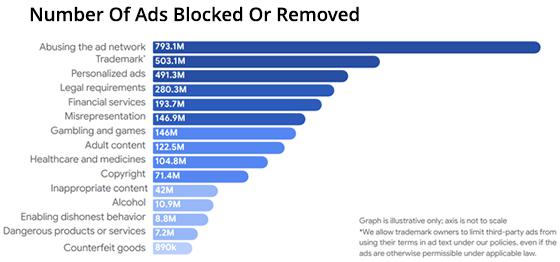
Artificial intelligence (AI) has been crucial in helping
Google enforce policies and prevent bad actors and harmful content from reaching users. Its latest models contributed to detecting violations on 97% of the 1.3 billion publisher pages.
Google
blocked or removed more than 5.1 billion ads globally in 2024 -- of which about 793.1 million abused the ad network. It blocked 503.1 million trademarks, 491.3 million personalized ads, 280.3
million legal requirements, and 193.7 million financial services.
It also suspended more than 39.2 million advertiser accounts in 2024, often before they could serve harmful ads.
The numbers come from Google’s 2024 Ads Safety Report highlighted how Google’s investments in AI-powered technology and large language models (LLMs) improves enforcement against bad ads,
ability to prevent fraud, and uncover and avoid networks of bad actors and repeat offenders.
advertisement
advertisement
Google continues to advance its LLMs, launching more than 50 enhancements to its models to enable
more efficient and precise enforcement. Prioritizing these technical advancements allows the teams to focus on more complex, ambiguous problems.
Its publisher policies enforced by AI -- which
helps ensure that publishers can safely monetize content through ads -- contributed to the detection and enforcement of 97% of the pages it took action on last year.
By using these models,
Google explained in the report how it expedited site reviews, enabling quicker monetization while keeping ads from appearing on violative pages.
Google blocked or restricted ads on 1.3 billion
publisher pages and took broader site-level enforcement action on more than 220,000 publisher sites. In the past year to support this enforcement, 30 updates were made to its Ads and Publisher
policies.
And for the first time in the report, Google outlined specific U.S. enforcement data.
In the U.S., 1.8 billion ads were removed and 39.2 million ad accounts suspended. The
top five violation policies included abusing the ad network, trademark, personalized ads, healthcare and medicines, and misrepresentation.
Google supports the open web by helping publishers
monetize their content, but the content is subject to certain policies and restrictions -- similar to other areas.
Of the 1.3 billion pages that Google acted against in 2024, with the top five
on publisher sites, 1.2 billion were based on sexual content, 24.8 million for dangerous or derogatory content, 19.3 million for malicious or unwanted software, 13.6 million for shocking content, and
12.8 million for Weapons promotion and sales.